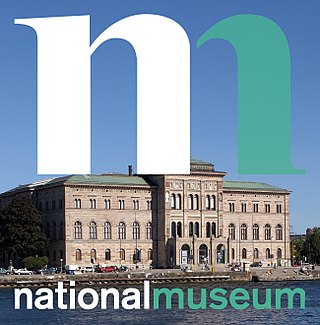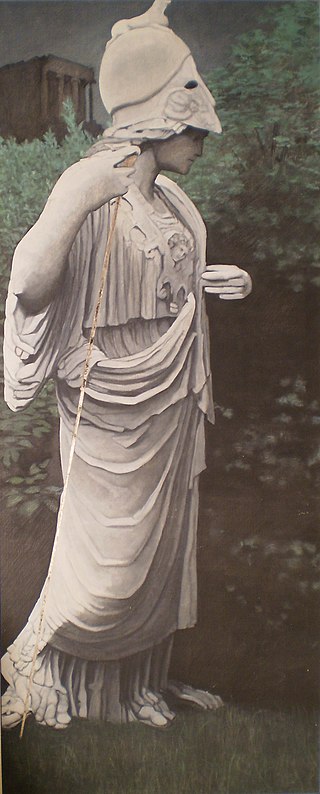
North Carolina State University is a public land-grant research university in Raleigh, North Carolina. Founded in 1887 and part of the University of North Carolina system, it is the largest university in the Carolinas. The university forms one of the corners of the Research Triangle together with Duke University in Durham and the University of North Carolina at Chapel Hill. It is classified among "R1: Doctoral Universities – Very high research activity".

The Honolulu Museum of Art is an art museum in Honolulu, Hawaiʻi. The museum is the largest of its kind in the state, and was founded in 1922 by Anna Rice Cooke. The museum has one of the largest single collections of Asian and Pan-Pacific art in the United States, and since its official opening on April 8, 1927, its collections have grown to more than 55,000 works of art.

Nationalmuseum is the national gallery of Sweden, located on the peninsula Blasieholmen in central Stockholm.

Wayland High School is the public high school for the town of Wayland, Massachusetts, United States. During the 2021–2022 school year, there were 831 students enrolled at the high school. Wayland High School is consistently ranked as one of the best schools in the Boston area. In 2022 Boston Magazine ranked WHS as #5 on their list of "Best Public High Schools in Boston".

The Main Campus is the primary campus of North Carolina State University, located in Raleigh, North Carolina, US, inside the Beltline. Notable features of Main Campus include the Bell Tower and D. H. Hill Library. The campus is known for its distinctive red brick buildings, sidewalks, plazas, and sculptures; some are dotted with decorative brick mosaics. University Plaza is nicknamed "The Brickyard" because it is mostly a flat, open, bricked area.

Glenn David Lowry is an American art historian and director of the Museum of Modern Art (MoMA) in New York City since 1995. His initiatives there include strengthening MoMA's contemporary art program, significantly developing the collection holdings in all media, and guiding two major campaigns for the renovation, expansion, and endowment of the museum. He has lectured and written extensively in support of contemporary art and artists and the role of museums in society, among other topics.

Gulfport High School (GHS) is a public high school located in Gulfport, Mississippi, United States. It is part of the Gulfport School District.
Philip Goodwin Freelon was an American architect. He was best known for leading the design team of the Smithsonian Institution's National Museum of African American History and Culture.
The John B. Putnam, Jr. Memorial Collection of Sculpture is a group of outdoor sculptures distributed through the Princeton University campus in Princeton, New Jersey. The collection is made up of works from 20th and 21st century sculptors. In March 1968, President Robert Goheen announced that an anonymous donor gave a $1 million fund for the collection in honor of Princeton alumni John B. Putnam, Jr., Lieutenant U.S.A, who was killed in action during World War II. The works were selected based on a committee of alumni who current or former directors of art museums, and the first 20 were purchased in 1969 and 1970.

Trude Guermonprez, born Gertrud Emilie Jalowetz, was a German-born American textile artist, designer and educator, known for her tapestry landscapes. Her Bauhaus-influenced disciplined abstraction for hand woven textiles greatly contributed to the American craft and fiber art movements of the 1950s, 60s and even into the 70s, particularly during her tenure at the California College of Arts and Crafts.

Marcia Marcus is an American figurative painter of portraits, self-portraits, still life, and landscape.
Gilda Snowden was an African-American artist, educator and mentor from Detroit, Michigan.

The Longview Museum of Fine Arts (LMFA) is an art museum in downtown Longview, Texas. It was founded in 1958 by the Junior Service League of Longview. Since 1998, it has been on Tyler Street in downtown Longview.
Jeanne Jaffe is an American multidisciplinary artist known for her sculpture and installations.

Waldemar Raemisch was a German-born American sculptor and educator.

Mary Ann Scherr was an American designer, metalsmith and educator. She was known for her jewellery design and industrial design, but she also worked as a graphic designer, illustrator, game designer, fashion and costume designer and silversmith.
The Missoula Art Museum (MAM) is a contemporary art museum in Missoula, Montana. MAM was founded in 1975 as the Missoula Museum for the Arts and has been accredited by the American Alliance of Museums since 1987.
Lillian Wolock Elliott (1930–1994) was an American fiber artist, and textile designer. She is known for her innovative basket craft.
Vernon Pratt was an American painter and jazz musician who worked in the style of minimalism and modernism. He created mainly black, white, and grayscale paintings focused on mathematical systems as well as rhythms, harmonies, variations, and permutations.
Ka Kwong Hui, also known as Hui Ka-Kwong (1922–2003) is a Chinese-born American potter, ceramist and educator. He is known for his fine art pottery work, a fusion of Chinese and American styles, and his work within the pop art movement.














